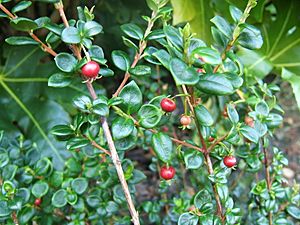Ugni facts for kids
Quick facts for kids Ugni |
|
|---|---|
 |
|
| Ugni molinae | |
| Scientific classification |
|
| Kingdom: | Plantae |
| Clade: | Tracheophytes |
| Clade: | Angiosperms |
| Clade: | Eudicots |
| Clade: | Rosids |
| Order: | Myrtales |
| Family: | Myrtaceae |
| Subfamily: | Myrtoideae |
| Tribe: | Myrteae |
| Genus: | Ugni Turcz. |
| Type species | |
| Ugni molinae |
|
Ugni is a group of plants in the myrtle family, called Myrtaceae. There are four different kinds, or species, of Ugni plants. All of them grow in western America.
Contents
What Ugni Plants Look Like
Ugni plants are small evergreen shrubs. This means they stay green all year round.
Their leaves are simple and grow opposite each other on the stem. They are shaped like an oval. The leaves are about 1 to 2 centimeters long. They are also 0.2 to 2.5 centimeters wide. They are dark green. If you break a leaf, it has a spicy smell.
The flowers usually hang down. They are about 1 to 2 centimeters wide. Each flower has four or five white or light pink petals. They also have many short stamens, which are the parts that make pollen.
The fruit of the Ugni plant is a small berry. It can be red or purple. It is about 1 centimeter wide. Inside the berry, there are many seeds.
How Ugni Got Its Name
The name Ugni comes from the word Uñi. This is what the Mapuche people call the fruits of the best-known Ugni plant, Ugni molinae. The Mapuche are native people from south-central Chile and southwestern Argentina.
Long ago, the Ugni group of plants was often put into other plant groups. These groups were called Myrtus or Eugenia. But Ugni plants are different. Their flowers hang down, and their stamens are shorter than their petals. This helps scientists tell them apart.
A Russian botanist, Nicolai Stepanowitsch Turczaninow, first named the Ugni group of plants in 1849.
Where Ugni Plants Grow
All the different kinds of Ugni plants grow in western South and Central America. You can find them from southern Mexico all the way down to central southern Chile and Argentina. They also grow in countries like Bolivia, Venezuela, and northern Brazil.
Types of Ugni Species
There are four main types, or species, in the Ugni group:
- Ugni candollei (Barnéoud) O.Berg: Found in Chile.
- Ugni molinaeTurcz.: Found in Chile and Argentina.
- Ugni myricoides (Kunth) O.Berg: Grows from southern Mexico and Central America to Bolivia, Venezuela, and northern Brazil.
- Ugni selkirkii (Hook. & Arn.) O.Berg: This species is special. It only grows on the Juan Fernández Islands in Chile.
Uses of Ugni Plants
The plant Ugni molinae is grown for two main reasons. First, it is used as an ornamental plant. This means people grow it because it looks pretty in gardens.
Second, its fruits are edible. This means you can eat them! These small berries are also used to make tasty jams.
See also
 In Spanish: Ugni para niños
In Spanish: Ugni para niños
 | Emma Amos |
 | Edward Mitchell Bannister |
 | Larry D. Alexander |
 | Ernie Barnes |

